- Home
- W. Somerset Maugham
Cosmopolitans Page 3
Cosmopolitans Read online
Page 3
I had not the least notion what he was talking about. He reminded me of our interview, he repeated to me what we had said, and gradually, out of the night, a dim recollection of the incident came back to me.
“I was wondering if I’d ever see you again,” he said, “I was wondering if ever I’d have a chance of thanking you for all you’ve done for me.”
“It’s been a success then?”
I looked at him. He was very fat now and bald, but his eyes twinkled gaily and his fleshy, red face bore an expression of perfect good-humour. The clothes he wore, terribly shabby they were, had been made obviously by a Spanish tailor and his hat was the wide-brimmed sombrero of the Spaniard. He looked to me as though he knew a good bottle of wine when he saw it. He had a dissipated, though entirely sympathetic, appearance. You might have hesitated to let him remove your appendix, but you could not have imagined a more delightful creature to drink a glass of wine with.
“Surely you were married?” I said.
“Yes. My wife didn’t like Spain, she went back to Camberwell, she was more at home there.”
“Oh, I’m sorry for that."
His black eyes flashed a bacchanalian smile. He really had somewhat the look of a young Silenus.
“Life is full of compensations,” he murmured.
The words were hardly out of his mouth when a Spanish woman, no longer in her first youth, but still boldly and voluptuously beautiful, appeared at the door. She spoke to him in Spanish, and I could not fail to perceive that she was the mistress of the house.
As he stood at the door to let me out he said to me:
“You told me when last I saw you that if I came here I should earn just enough money to keep body and soul together, but that I should lead a wonderful life. Well, I want to tell you that you were right. Poor I have been and poor I shall always be, but by heaven I’ve enjoyed myself. I wouldn’t exchange the life I’ve had with that of any king in the world.”
THE DREAM
IT CHANCED that in August 1917 the work upon which I was then engaged obliged me to go from New York to Petrograd, and I was instructed for safety’s sake to travel by way of Vladivostok. I landed there in the morning and passed an idle day as best I could. The trans-Siberian train was due to start, so far as I remember, at about nine in the evening. I dined at the station restaurant by myself. It was crowded and I shared a small table with a man whose appearance entertained me. He was a Russian, a tall fellow, but amazingly stout, and he had so vast a paunch that he was obliged to sit well away from the table. His hands, small for his size, were buried in rolls of fat. His hair, long, dark, and thin, was brushed carefully across his crown in order to conceal his baldness, and his huge sallow face, with its enormous double chin, clean-shaven, gave you an impression of indecent nakedness. His nose was small, a funny little button upon that mass of flesh, and his black shining eyes were small too. But he had a large, red, and sensual mouth. He was dressed neatly enough in a black suit. It was not worn but shabby; it looked as if it had been neither pressed nor brushed since he had had it.
The service was bad and it was almost impossible to attract the attention of a waiter. We soon got into conversation. The Russian spoke good and fluent English. His accent was marked but not tiresome. He asked me many questions about myself and my plans, which-my occupation at the time making caution necessary-I answered with a show of frankness but with dissimulation. I told him I was a journalist. He asked me whether I wrote fiction and when I confessed that in my leisure moments I did, he began to talk of the later Russian novelists. He spoke intelligently. It was plain that he was a man of education.
By this time we had persuaded the waiter to bring us some cabbage soup, and my acquaintance pulled a small bottle of vodka from his pocket which he invited me to share. I do not know whether it was the vodka or the natural loquaciousness of his race that made him communicative, but presently he told me, unasked, a good deal about himself. He was of noble birth, it appeared, a lawyer by profession, and a radical. Some trouble with the authorities had made it necessary for him to be much abroad, but now he was on his way home. Business had detained him at Vladivostok, but he expected to start for Moscow in a week and if I went there he would be charmed to see me.
“Are you married?” he asked me.
I did not see what business it was of his, but I told him that I was. He sighed a little.
“I am a widower,” he said. “My wife was a Swiss, a native of Geneva. She was a very cultivated woman. She spoke English, German, and Italian perfectly. French, of course, was her native tongue. Her Russian was much above the average for a foreigner. She had scarcely the trace of an accent.”
He called a waiter who was passing with a tray full of dishes and asked him, I suppose-for then I knew hardly any Russian-how much longer we were going to wait for the next course. The waiter, with a rapid but presumably reassuring exclamation, hurried on, and my friend sighed.
“Since the revolution the waiting in restaurants has become abominable.”
He lighted his twentieth cigarette and I, looking at my watch, wondered whether I should get a square meal before it was time for me to start.
“My wife was a very remarkable woman,” he continued. “She taught languages at one of the best schools for the daughters of noblemen in Petrograd. For a good many years we lived together on perfectly friendly terms. She was, however, of a jealous temperament and unfortunately she loved me to distraction.”
It was difficult for me to keep a straight face. He was one of the ugliest men I had ever seen. There is sometimes a certain charm in the rubicund and jovial fat man, but this saturnine obesity was repulsive.
“I do not pretend that I was faithful to her. She was not young when I married her and we had been married for ten years. She was small and thin, and she had a bad complexion. She had a bitter tongue. She was a woman who suffered from a fury of possession, and she could not bear me to be attracted to anyone but her. She was jealous not only of the women I knew, but of my friends, my cat, and my books. On one occasion in my absence she gave away a coat of mine merely because I liked none of my coats so well. But I am of an equable temperament. I will not deny that she bored me, but I accepted her acrimonious disposition as an act of God and no more thought of rebelling against it than I would against bad weather or a cold in the head. I denied her accusations as long as it was possible to deny them, and when it was impossible I shrugged my shoulders and smoked a cigarette.
“The constant scenes she made me did not very much affect me. I led my own life. Sometimes, indeed, I wondered whether it was passionate love she felt for me or passionate hate. It seemed to me that love and hate were very near allied.
“So we might have continued to the end of the chapter if one night a very curious thing had not happened. I was awakened by a piercing scream from my wife. Startled, I asked her what was the matter. She told me that she had had a fearful nightmare; she had dreamt that I was trying to kill her. We lived at the top of a large house and the well round which the stairs climbed was broad. She had dreamt that just as we had arrived at our own floor I had caught hold of her and attempted to throw her over the balusters. It was six storeys to the stone floor at the bottom and it meant certain death.
“She was much shaken. I did my best to soothe her. But next morning, and for two or three days after, she referred to the subject again and, notwithstanding my laughter, I saw that it dwelt in her mind. I could not help thinking of it either, for this dream showed me something that I had never suspected. She thought I hated her, she thought I would gladly be rid of her; she knew of course that she was insufferable, and at some time or other the idea had evidently occurred to her that I was capable of murdering her. The thoughts of men are incalculable and ideas enter our minds that we should be ashamed to confess. Sometimes I had wished that she might run away with a lover, sometimes that a painless and sudden death might give me my freedom; but never, never had the idea come to me that I might deliberately rid
myself of an intolerable burden.
“The dream made an extraordinary impression upon both of us. It frightened my wife, and she became for a little less bitter and more tolerant. But when I walked up the stairs to our apartment it was impossible for me not to look over the balusters and reflect how easy it would be to do what she had dreamt. The balusters were dangerously low. A quick gesture and the thing was done. It was hard to put the thought out of my mind. Then some months later my wife awakened me one night. I was very tired and I was exasperated. She was white and trembling. She had had the dream again. She burst into tears and asked me if I hated her. I swore by all the saints of the Russian calendar that I loved her. At last she went to sleep again. It was more than I could do. I lay awake. I seemed to see her falling down the well of the stairs, and I heard her shriek and the thud as she struck the stone floor. I could not help shivering.”
The Russian stopped and beads of sweat stood on his forehead. He had told the story well and fluently so that I had listened with attention. There was still some vodka in the bottle; he poured it out and swallowed it at a gulp.
“And how did your wife eventually die?” I asked after a pause.
He took out a dirty handkerchief and wiped his forehead.
“By an extraordinary coincidence she was found late one night at the bottom of the stairs with her neck broken.”
“Who found her?”
“She was found by one of the lodgers who came in shortly after the catastrophe.”
“And where were you?”
I cannot describe the look he gave me of malicious cunning. His little black eyes sparkled.
“I was spending the evening with a friend of mine. I did not come in till an hour later.”
At that moment the waiter brought us the dish of meat that we had ordered, and the Russian fell upon it with good appetite. He shovelled the food into his mouth in enormous mouthfuls.
I was taken aback. Had he really been telling me in this hardly veiled manner that he had murdered his wife? That obese and sluggish man did not look like a murderer; I could not believe that he would have had the courage. Or was he making a sardonic joke at my expense?
In a few minutes it was time for me to go and catch my train. I left him and I have not seen him since. But I have never been able to make up my mind whether he was serious or jesting.
IN A STRANGE LAND
I AM OF A ROVING DISPOSITION; but I travel not to see imposing monuments, which indeed somewhat bore me, nor beautiful scenery, of which I soon tire; I travel to see men. I avoid the great. I would not cross the road to meet a president or a king; I am content to know the writer in the pages of his book and the painter in his picture; but I have journeyed a hundred leagues to see a missionary of whom I had heard a strange story and I have spent a fortnight in a vile hotel in order to improve my acquaintance with a billiard marker. I should be inclined to say that I am not surprised to meet any sort of person were it not that there is one sort that I am constantly running against and that never fails to give me a little shock of amused astonishment. This is the elderly Englishwoman, generally of adequate means, who is to be found living alone, up and down the world, in unexpected places. You do not wonder when you hear of her living in a villa on a hill outside a small Italian town, the only Englishwoman in the neighbourhood, and you are almost prepared for it when a lonely hacienda is pointed out to you in Andalusia and you are told that there has dwelt for many years an English lady. But it is more surprising when you hear that the only white person in a Chinese city is an Englishwoman, not a missionary, who lives there none knows why; and there is another who inhabits an island in the South Seas and a third who has a bungalow on the outskirts of a large village in the centre of Java. They live solitary lives, these women, without friends, and they do not welcome the stranger. Though they may not have seen one of their own race for months they will pass you on the road as though they did not see you, and if, presuming on your nationality, you should call, as likely as not they will decline to sec you; but if they do, they will give you a cup of tea from a silver teapot and on a plate of Old Worcester you will find Scotch scones. They will talk to you politely, as though they were entertaining you in a Kentish vicarage, but when you take your leave will show no particular desire to continue the acquaintance. One wonders in vain what strange instinct it is that has driven them to separate themselves from their kith and kin and thus to live apart from all their natural interests in an alien land. Is it romance they have sought or freedom?
But of all these Englishwomen whom I have met or perhaps only heard of (for as I have said they are difficult of access) the one who remains most vividly in my memory is an elderly person who lived in Asia Minor. I had arrived after a tedious journey at a little town from which I proposed to make the ascent of a celebrated mountain and I was taken to a rambling hotel that stood at its foot. I arrived late at night and signed my name in the book. I went up to my room. It was cold and I shivered as I undressed, but in a moment there was a knock at the door and the dragoman came in.
“Signora Niccolini’s compliments,” he said.
To my astonishment he handed me a hot-water bottle. I took it with grateful hands.
“Who is Signora Niccolini?” I asked.
“She is the proprietor of this hotel.”
I sent her my thanks and he withdrew. The last thing I expected in a scrubby hotel in Asia Minor kept by an old Italian woman was a beautiful hot-water bottle. There is nothing I like more (if we were not all sick to death of the war I would tell you the story of how six men risked their lives to fetch a hot-water bottle from a château in Flanders that was being bombarded) ; and next morning, so that I might thank her in person, I asked if I might see the Signora Niccolini. While I waited for her I racked my brains to think what hot-water bottle could possibly be in Italian. In a moment she came in. She was a little stout woman, not without dignity, and she wore a black apron trimmed with lace and a small black lace cap. She stood with her hands crossed. I was astonished at her appearance for she looked exactly like a housekeeper in a great English house.
“Did you wish to speak to me, sir?”
She was an Englishwoman and in those few words I surely recognized the trace of a cockney accent.
“I wanted to thank you for the hot-water bottle,” I replied in some confusion.
“I saw by the visitors’ book that you were English, sir, and I always send up a ’ot-water bottle to English gentlemen.”
“Believe me, it was very welcome.”
“I was for many years in the service of the late Lord Ormskirk, sir. He always used to travel with a ’ot-water bottle. Is there anything else, sir?” “Not at the moment, thank you.”
She gave me a polite little nod and withdrew. I wondered how on earth it came about that a funny old Englishwoman like that should be the landlady of a hotel in Asia Minor. It was not easy to make her acquaintance, for she knew her place, as she would herself have put it, and she kept me at a distance. It was not for nothing that she had been in service in a noble English family. But I was persistent and I induced her at last to ask me to have a cup of tea in her own little parlour. I learnt that she had been lady’s maid to a certain Lady Orms-kirk, and Signor Niccolini (for she never alluded to her deceased husband in any other way) had been his lordship’s chef. Signor Niccolini was a very handsome man and for some years there had been an “understanding” between them. When they had both saved a certain amount of money they were married, retired from service, and looked about for a hotel. They had bought this one on an advertisement because Signor Niccolini thought he would like to see something of the world. That was nearly thirty years ago and Signor Niccolini had been dead for fifteen. His widow had not once been back to England. I asked her if she was never homesick.
“I don’t say as I wouldn’t like to go back on a visit, though I expect I’d find many changes. But my family didn’t like the idea of me marrying a foreigner and I ’aven’t spoken to them since. Of
course there are many things here that are not the same as what they ’ave at ’ome, but it’s surprising what you get used to. I see a lot of life. I don’t know as I should care to live the ’umdrum life they do in a place like London.”
I smiled. For what she said was strangely incongruous with her manner. She was a pattern of decorum. It was extraordinary that she could have lived for thirty years in this wild, and almost barbaric, country without its having touched her. Though I knew no Turkish and she spoke it with ease I was convinced that she spoke it most incorrectly and with a cockney accent. I suppose she had remained the precise, prim English lady’s maid, knowing her place, through all these vicissitudes because she had no faculty of surprise. She took everything that came as a matter of course. She looked upon everyone who wasn’t English as a foreigner and therefore as someone, almost imbecile, for whom allowances must be made. She ruled her staff despotically—for did she not know how an upper servant in a great house should exercise his authority over the under servants?—and everything about the hotel was clean and neat.
“I do my best,” she said, when I congratulated her on this, standing, as always when she spoke to me, with her hands respectfully crossed. “Of course one can’t expect foreigners to ’ave the same ideas as we ’ave, but as his lordship used to say to me, what we’ve got to do, Parker, he said to me, what we’ve got to do in this life is to make the best of our raw material.”
But she kept her greatest surprise for the eve of my departure.
“I’m glad you’re not going before you’ve seen my two sons, sir.”
“I didn’t know you had any.”
“They’ve been away on business, but they’ve just come back. You’ll be surprised when you’ve seen them. I’ve trained them with me own ’ands so to speak, and when I’m gone they’ll carry on the ’otel between them.”

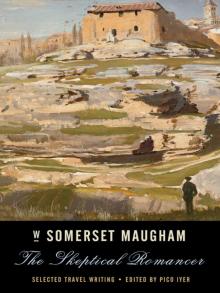 The Skeptical Romancer: Selected Travel Writing
The Skeptical Romancer: Selected Travel Writing The Summing Up
The Summing Up Up at the Villa
Up at the Villa The Razor's Edge
The Razor's Edge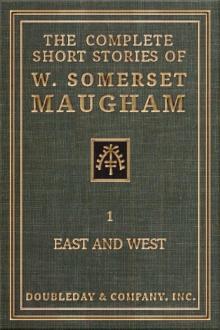 The Complete Short Stories of W. Somerset Maugham: East and West (Vol. 1 of 2))
The Complete Short Stories of W. Somerset Maugham: East and West (Vol. 1 of 2))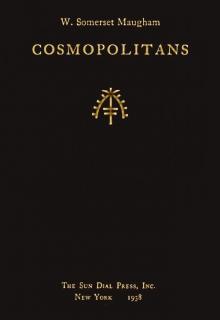 Cosmopolitans
Cosmopolitans 65 Short Stories
65 Short Stories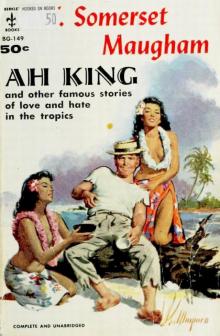 Ah King (Works of W. Somerset Maugham)
Ah King (Works of W. Somerset Maugham) Collected Short Stories: Volume 1
Collected Short Stories: Volume 1 Collected Short Stories Volume 2
Collected Short Stories Volume 2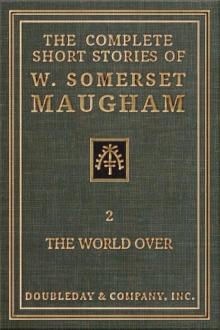 The Complete Short Stories of W. Somerset Maugham - II - The World Over
The Complete Short Stories of W. Somerset Maugham - II - The World Over Collected Short Stories Volume 4
Collected Short Stories Volume 4 Theatre
Theatre Short Stories
Short Stories Then and Now
Then and Now The Favorite Short Stories of W. Somerset Maugham
The Favorite Short Stories of W. Somerset Maugham Of Human Bondage
Of Human Bondage The Magician
The Magician The Great Exotic Novels and Short Stories of Somerset Maugham
The Great Exotic Novels and Short Stories of Somerset Maugham A Writer's Notebook
A Writer's Notebook Christmas Holiday
Christmas Holiday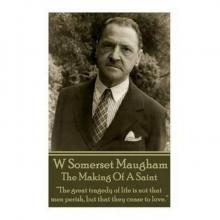 The Making of a Saint
The Making of a Saint Merry Go Round
Merry Go Round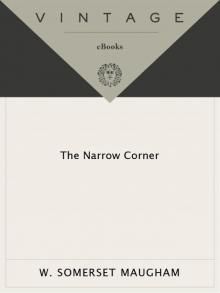 The Narrow Corner
The Narrow Corner Collected Short Stories Volume 3
Collected Short Stories Volume 3 Ten Novels and Their Authors
Ten Novels and Their Authors Ashenden
Ashenden The Moon and Sixpence
The Moon and Sixpence Cakes and Ale
Cakes and Ale Liza of Lambeth
Liza of Lambeth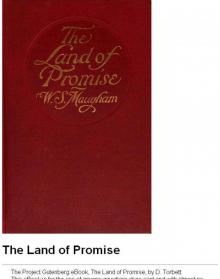 The Land of Promise: A Comedy in Four Acts (1922)
The Land of Promise: A Comedy in Four Acts (1922) A Writer's Notebook (Vintage International)
A Writer's Notebook (Vintage International)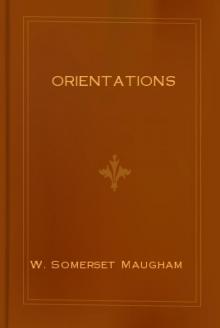 Orientations
Orientations Selected Masterpieces
Selected Masterpieces Mrs Craddock
Mrs Craddock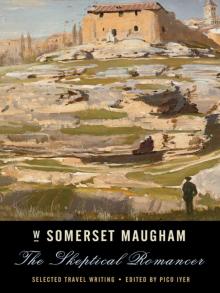 The Skeptical Romancer
The Skeptical Romancer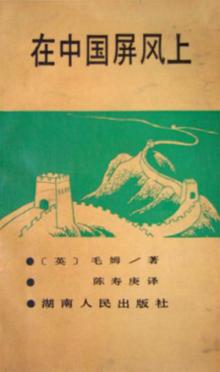 On a Chinese Screen
On a Chinese Screen (1941) Up at the Villa
(1941) Up at the Villa The Great Novels and Short Stories of Somerset Maugham
The Great Novels and Short Stories of Somerset Maugham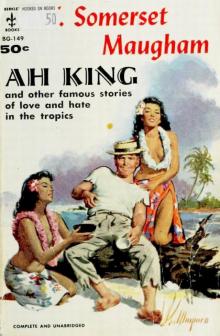 Ah King
Ah King The Explorer
The Explorer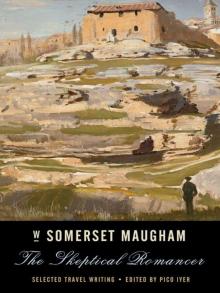 The Skeptical Romancer: Selected Travel Writing (Vintage Departures)
The Skeptical Romancer: Selected Travel Writing (Vintage Departures)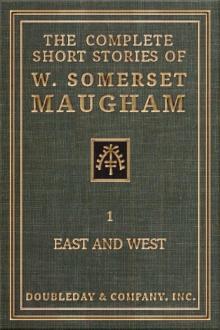 The Complete Short Stories of W. Somerset Maugham - I - East and West
The Complete Short Stories of W. Somerset Maugham - I - East and West